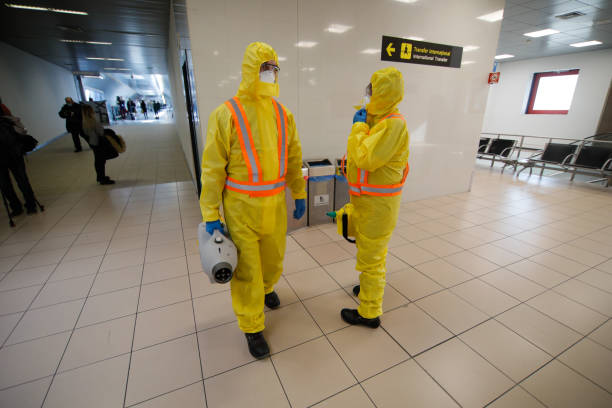How Long Does Coronavirus Last: A Comprehensive Guide
The ongoing global pandemic has brought the term "coronavirus" into the forefront of public consciousness. The virus responsible for the pandemic, SARS-CoV-2, causes the disease known as COVID-19. One of the most commonly asked questions is: How long does coronavirus last? Understanding the duration of the virus's presence in an individual's body is crucial for managing its spread and for taking appropriate measures to protect oneself and others. In this comprehensive guide, we delve into the various stages of a COVID-19 infection and explore the timeline of how long the virus typically persists.
The Onset and Early Symptoms
Upon exposure to the virus, the incubation period for COVID-19 typically ranges from 2 to 14 days, with an average of around 5 to 6 days. This is the period between exposure to the virus and the appearance of symptoms. It's important to note that some individuals might remain asymptomatic throughout their infection, meaning they show no symptoms at all.
As the virus replicates within the body, infected individuals may begin to experience a wide range of symptoms. These can vary from mild to severe and might include fever, cough, shortness of breath, fatigue, body aches, loss of taste or smell, sore throat, and more. The duration of the early symptomatic phase can vary but often lasts about 7 to 14 days. However, it's worth mentioning that some individuals might recover from mild symptoms within a week, while others, especially those with severe cases, might experience symptoms for several weeks.
The Acute Phase and Recovery
For individuals with moderate cases of COVID-19, the acute phase usually occurs during the second week of illness. This is when the virus has reached its peak replication within the body, and symptoms might worsen. Pneumonia and acute respiratory distress syndrome (ARDS) are potential complications that can arise during this phase, leading to extended hospital stays and medical interventions. Fortunately, many individuals begin to recover from the acute phase by the end of the third week, although recovery times can vary.
Most people with mild to moderate cases of COVID-19 can expect to recover fully within 2 to 6 weeks from the onset of symptoms. It's important to note that recovery doesn't always mean an immediate return to pre-illness health. Some individuals might experience lingering symptoms such as fatigue, shortness of breath, and loss of taste or smell for several weeks or even months after their initial infection. This condition is often referred to as "long COVID" or "post-acute sequelae of SARS-CoV-2 infection" (PASC).
Severe Cases and Prolonged Illness
Severe cases of COVID-19, often characterized by severe respiratory distress and multi-organ involvement, can lead to extended hospitalization and recovery times. Some individuals might spend weeks or even months in intensive care units, requiring ventilator support. The road to recovery for severe cases can be arduous, involving physical therapy, rehabilitation, and close medical monitoring.
Prolonged illness due to COVID-19 has raised concerns about the potential long-term effects of the virus. Reports of lingering symptoms, such as brain fog, heart palpitations, and joint pain, have been documented even in individuals who had mild or asymptomatic cases. Research is ongoing to understand the mechanisms behind these prolonged symptoms and to develop effective treatments.
Vaccination and Immunity
The development of vaccines has been a pivotal advancement in the fight against COVID-19. Vaccination not only reduces the risk of severe illness and death but also contributes to controlling the spread of the virus. Different vaccines have varying efficacy rates, but all authorized vaccines have proven to be highly effective in reducing the severity of illness and the likelihood of hospitalization.
It's important to note that while vaccines significantly lower the risk of infection and its severe outcomes, breakthrough infections can still occur. In these cases, individuals who are fully vaccinated might test positive for the virus but are more likely to experience mild or asymptomatic cases. The duration of viral shedding – the time during which the virus can be detected in respiratory samples – in breakthrough cases tends to be shorter than in unvaccinated individuals.
Conclusion
In conclusion, the duration of a COVID-19 infection can vary widely depending on the severity of the case and the individual's overall health. From the onset of symptoms to full recovery, the timeline typically spans several weeks, with the possibility of lingering symptoms lasting even longer. Severe cases can lead to prolonged illness and recovery times, while mild cases might resolve within a shorter period.
The emergence of effective vaccines has significantly altered the landscape of the pandemic, offering hope for controlling its spread and reducing its impact. Vaccination not only protects individuals from severe illness but also contributes to the broader goal of achieving herd immunity, thereby safeguarding entire communities.
As our understanding of COVID-19 continues to evolve through ongoing research, it's essential to stay informed by relying on reputable sources such as public health agencies and medical experts. Adhering to recommended preventive measures, such as vaccination, wearing masks in crowded settings, practicing good hand hygiene, and maintaining physical distance, remains crucial in our collective effort to overcome the pandemic and move toward a healthier future.
The ongoing global pandemic has brought the term "coronavirus" into the forefront of public consciousness. The virus responsible for the pandemic, SARS-CoV-2, causes the disease known as COVID-19. One of the most commonly asked questions is: How long does coronavirus last? Understanding the duration of the virus's presence in an individual's body is crucial for managing its spread and for taking appropriate measures to protect oneself and others. In this comprehensive guide, we delve into the various stages of a COVID-19 infection and explore the timeline of how long the virus typically persists.
The Onset and Early Symptoms
Upon exposure to the virus, the incubation period for COVID-19 typically ranges from 2 to 14 days, with an average of around 5 to 6 days. This is the period between exposure to the virus and the appearance of symptoms. It's important to note that some individuals might remain asymptomatic throughout their infection, meaning they show no symptoms at all.
As the virus replicates within the body, infected individuals may begin to experience a wide range of symptoms. These can vary from mild to severe and might include fever, cough, shortness of breath, fatigue, body aches, loss of taste or smell, sore throat, and more. The duration of the early symptomatic phase can vary but often lasts about 7 to 14 days. However, it's worth mentioning that some individuals might recover from mild symptoms within a week, while others, especially those with severe cases, might experience symptoms for several weeks.
The Acute Phase and Recovery
For individuals with moderate cases of COVID-19, the acute phase usually occurs during the second week of illness. This is when the virus has reached its peak replication within the body, and symptoms might worsen. Pneumonia and acute respiratory distress syndrome (ARDS) are potential complications that can arise during this phase, leading to extended hospital stays and medical interventions. Fortunately, many individuals begin to recover from the acute phase by the end of the third week, although recovery times can vary.
Most people with mild to moderate cases of COVID-19 can expect to recover fully within 2 to 6 weeks from the onset of symptoms. It's important to note that recovery doesn't always mean an immediate return to pre-illness health. Some individuals might experience lingering symptoms such as fatigue, shortness of breath, and loss of taste or smell for several weeks or even months after their initial infection. This condition is often referred to as "long COVID" or "post-acute sequelae of SARS-CoV-2 infection" (PASC).
Severe Cases and Prolonged Illness
Severe cases of COVID-19, often characterized by severe respiratory distress and multi-organ involvement, can lead to extended hospitalization and recovery times. Some individuals might spend weeks or even months in intensive care units, requiring ventilator support. The road to recovery for severe cases can be arduous, involving physical therapy, rehabilitation, and close medical monitoring.
Prolonged illness due to COVID-19 has raised concerns about the potential long-term effects of the virus. Reports of lingering symptoms, such as brain fog, heart palpitations, and joint pain, have been documented even in individuals who had mild or asymptomatic cases. Research is ongoing to understand the mechanisms behind these prolonged symptoms and to develop effective treatments.
Vaccination and Immunity
The development of vaccines has been a pivotal advancement in the fight against COVID-19. Vaccination not only reduces the risk of severe illness and death but also contributes to controlling the spread of the virus. Different vaccines have varying efficacy rates, but all authorized vaccines have proven to be highly effective in reducing the severity of illness and the likelihood of hospitalization.
It's important to note that while vaccines significantly lower the risk of infection and its severe outcomes, breakthrough infections can still occur. In these cases, individuals who are fully vaccinated might test positive for the virus but are more likely to experience mild or asymptomatic cases. The duration of viral shedding – the time during which the virus can be detected in respiratory samples – in breakthrough cases tends to be shorter than in unvaccinated individuals.
Conclusion
In conclusion, the duration of a COVID-19 infection can vary widely depending on the severity of the case and the individual's overall health. From the onset of symptoms to full recovery, the timeline typically spans several weeks, with the possibility of lingering symptoms lasting even longer. Severe cases can lead to prolonged illness and recovery times, while mild cases might resolve within a shorter period.
The emergence of effective vaccines has significantly altered the landscape of the pandemic, offering hope for controlling its spread and reducing its impact. Vaccination not only protects individuals from severe illness but also contributes to the broader goal of achieving herd immunity, thereby safeguarding entire communities.
As our understanding of COVID-19 continues to evolve through ongoing research, it's essential to stay informed by relying on reputable sources such as public health agencies and medical experts. Adhering to recommended preventive measures, such as vaccination, wearing masks in crowded settings, practicing good hand hygiene, and maintaining physical distance, remains crucial in our collective effort to overcome the pandemic and move toward a healthier future.




